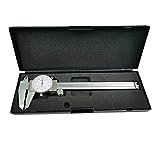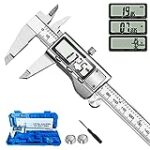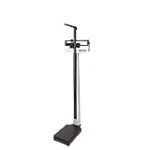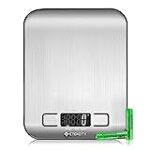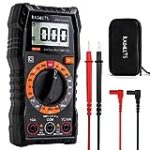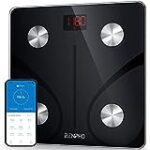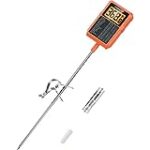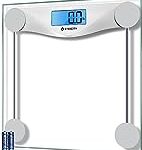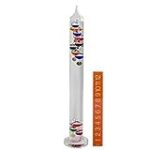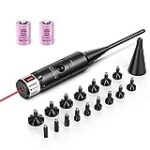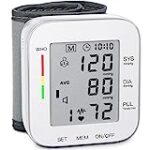🌅 Introduction
Are you in search of the best value dial calipers that strike the perfect balance between price and quality? Look no further! Welcome to our comprehensive guide, where we have scoured the market for the finest options available. We understand that finding the right dial calipers can be challenging, especially with a plethora of choices out there. But fret not, as we have done all the hard work for you. In this best value dial calipers guide, we will provide you with unbiased reviews, expert recommendations, and valuable insights to help you make an informed decision. Get ready to measure with precision and accuracy!
🏆 Our Top 5
- [Application]: Stainless steel dial caliper; Home DIY and professional use are both highly recommended.
- [Featured Double Shock Proof Design]: Fine polished solid hardened stainless steel supports smooth sliding and accurate result.
- [Feature]: Measure range: 0-6 inch; Accuracy: ±0.001"; Division: 0.001"; Repeatability: 0.0005".
- [Note]: Each dial caliper has been fully calibrated before ready to sell.
- [Measurement Method]: 4 way measurements: inside, outside, depth, and step.
- New designed dial movement for ultra smooth sliding and high shock protection
- Improved finish on sliding surfaces for longevity.
- Lock screw for dial bezel and for holding the sliding jaw position
- New face for improved readability.
- Can measure OD, ID, depth and steps.
- Achieve Superior Accuracy - Designed with high precision, this caliper provides reliable measurements up to 0.001" accuracy, making it essential for machinists, metalworkers, and engineers handling intricate projects.
- Engineered for Durability - Manufactured from hardened stainless steel, this caliper withstands frequent use and offers long-term resistance against wear, rust, and deformation in demanding work environments.
- Versatile Measuring Capabilities - Allows for seamless measurement of outside dimensions, inside dimensions, depth, and step, ensuring it is versatile for tasks such as machining and woodworking.
- Enhanced User Experience - Equipped with a clear, sharp dial face, thumb-operated fine adjustment, and ergonomic design, this tool ensures precise and comfortable handling even during extended use.
- Stable and Secure Operation - Features locking screws for the sliding jaw and dial bezel, providing stability and preventing accidental movement during critical measurement tasks for consistent, repeatable results.
- 【High Precision Measuring Tools 】Kynup digital caliper measuring range is 0-6inch/150mm, accuracy ± 0.001"/0.02 mm, resolution of 0.0005"/0.01 mm. for more precision measure results, our caliper measuring tool is suitable for jewelry measurement, household, DIY, woodworking, etc.
- 【Longer Lifespan】With a complete power-off button shutdown, Kynup digital caliper measuring tool is completely powered off when the button is pressed, which does not consume battery power and provides a longer service life than other micrometer caliper digital
- 【3 Units Conversion】Our dial caliper micrometer can be freely switched among inches, millimeters and fractions. 3 kinds of unit switching function can meet your different habits and needs. Digital calipers 6inch more convenient, more widely used to measure the value you want.
- 【Screen Splash Proof & Stainless Steel Material】The dial caliper micrometer is constructed of first-class STAINLESS STEEL, screen splash water protection, anti-rust, which has a strong frame with lockable head. The housing is made of metal with silver paint on the surface. Note: please do not install the battery backwards.
- 【4 Measuring Ways】 This digital caliper measuring tool is easy to measure depth, step, external and internal diameter, making all your objects measurable. 3 batteries are provided: one installed and other two as spare batteries. Auto shutdown for saving battery after within 6 minutes if without operation.
- Higher quality dial calipers: Dial calipers are the most versatile precision hand tools on the market and have always been the choice of machining professionals.
- Features double shockproof design: two-way roller shockproof, fine tuning precision.
- Operation is simple: it has a thumbs-operated trimmer roller, knife edge contact, and active spring loading, dual pinion, anti-rebound control.
- Measuring range :0-6 inches; Dial diameter :1.5 inches; Accuracy :±0.001 "Division: 0.001".
- 4-way measurement: Dial calipers provide accurate measurement of external dimensions, internal dimensions, depth and steps for metalworking.
🤔 How to choose?
1. Accuracy
When it comes to choosing a dial caliper, accuracy is paramount. Look for calipers that have a high level of accuracy, typically measured in fractions of an inch or millimeters.
For precise measurements, **opt for a dial caliper with an accuracy of 0.001 inches**. This level of accuracy ensures that every measurement you take is reliable and consistent. Remember, the accuracy of the caliper directly impacts the accuracy of your measurements, making it an essential factor to consider.
2. Construction and Durability
The construction and durability of the dial caliper are crucial for long-lasting performance.
**Choose a caliper made from high-quality materials**, such as stainless steel, which offers excellent resistance to rust and corrosion. This ensures that your dial caliper will remain accurate and reliable even after prolonged use. Additionally, look for a caliper with a smooth and sturdy slide mechanism, as this contributes to its overall durability.
3. Ease of Use
When selecting a dial caliper, prioritize ease of use. Look for features such as a large and easy-to-read dial, a clear scale, and smooth adjustment mechanisms.
A caliper with a **user-friendly design** will make your measuring tasks much more efficient and enjoyable. Consider calipers with **thumb rollers for easy movement** and **lock screws for securing measurements**. These features allow for quick and precise measurements, saving you time and effort.
4. Versatility
Consider the versatility of the dial caliper before making a purchase. Look for features that enhance the caliper’s functionality, such as a depth gauge, step measurement capabilities, or interchangeable jaws for measuring different shapes and sizes.
A versatile dial caliper will allow you to tackle a wide range of measuring tasks with ease, making it a valuable tool in various industries, including woodworking, engineering, and metalworking.
5. Price
While price should not be the sole determining factor in your decision, it is an important consideration. **Set a budget and stick to it**, but remember that quality and accuracy often come with a higher price tag.
Investing in a higher-quality dial caliper will ensure its longevity and accuracy, ultimately saving you money in the long run. However, if your needs are more basic, there are affordable options available that can still offer reasonable accuracy and functionality.
In conclusion, choosing the right dial caliper involves considering factors such as accuracy, construction and durability, ease of use, versatility, and price. By taking these factors into account, you can select a dial caliper that meets your specific needs and delivers reliable and precise measurements. Remember, accuracy is key, so invest in a high-quality dial caliper that will serve you well for years to come.
💡 What to Look for in a dial calipers?
1. Accuracy and Precision
When looking for a dial caliper, one of the most important factors to consider is its accuracy and precision. After all, the main purpose of a dial caliper is to provide accurate measurements. Look for a caliper that has a high level of precision, with measurements that are consistently repeatable. This will ensure that your measurements are accurate and reliable. One way to assess accuracy is to check if the caliper has been calibrated to a recognized standard, such as ISO or NIST. Another factor to consider is the resolution of the caliper, which refers to the smallest increment it can measure. A higher resolution will allow for more precise measurements.
For example, the Mitutoyo 505-742 dial caliper offers a high level of accuracy, with a resolution of 0.001 inches and a range of 0-6 inches. This makes it ideal for precise measurements in various applications.
2. Durability and Quality
Another important aspect to look for in a dial caliper is its durability and quality. A caliper that is built to last will save you money in the long run, as you won’t have to constantly replace it. Look for a caliper made from high-quality materials, such as stainless steel, which is resistant to rust and corrosion. It’s also worth checking if the caliper has a hardened measuring surface, as this will ensure its longevity. Additionally, consider the overall construction of the caliper, paying attention to the feel and smoothness of its movement. A well-made caliper will have tight tolerances and smooth sliding action, allowing for accurate measurements.
One example of a durable and high-quality dial caliper is the Starrett 1202F-6 dial caliper. It is made from hardened stainless steel and features a smooth movement, ensuring accurate measurements and long-lasting performance.
3. Ease of Use
Lastly, consider the ease of use when choosing a dial caliper. Look for a caliper that is intuitive and user-friendly, with clear markings and easy-to-read dial or digital display. Additionally, consider the ergonomics of the caliper, as a comfortable grip and easy operation can greatly improve the overall user experience. Some calipers also come with additional features, such as a locking screw or thumb roller, which can make measurements even easier and more convenient.
The Fowler 52-008-706 dial caliper is an excellent example of a user-friendly caliper. It features a large, easy-to-read dial and a comfortable grip, allowing for effortless measurements. It also has a locking screw for added convenience and accuracy when taking measurements.
In conclusion, when looking for a dial caliper, it is important to consider factors such as accuracy and precision, durability and quality, and ease of use. By paying attention to these aspects, you can ensure that you choose a caliper that will provide accurate measurements, withstand the test of time, and offer a user-friendly experience.
🔍 How we picked?
1. Quality and Accuracy
When it comes to picking the perfect dial calipers, quality and accuracy are paramount. The precision of your measurements can make or break your projects, so it’s crucial to choose a caliper that delivers consistent and reliable results.
There are several factors to consider when assessing the quality and accuracy of a dial caliper. Firstly, look for a caliper made from high-quality materials such as stainless steel or hardened carbon steel. These materials ensure durability and resistance to wear and tear, guaranteeing the longevity of your caliper. A sturdy construction is essential for maintaining accuracy over time.
Furthermore, **check for the caliper’s accuracy rating**, often expressed as a fraction of an inch or a fraction of a millimeter. The lower the value, the higher the precision. A caliper with an accuracy rating of 0.001 inches or 0.02 millimeters is considered highly accurate and suitable for most applications.
2. Ease of Use
Working with complex equipment can be daunting, especially for beginners. That’s why it’s crucial to select a dial caliper that is easy to use. A user-friendly caliper will not only save you time but also prevent measurement errors.
Look for calipers with clear and easy-to-read dials or digital displays. The dial should be large and well-marked, ensuring that you can quickly and accurately interpret the measurements. Some calipers even feature an extra-large LCD screen with a backlight for enhanced visibility in low-light conditions.
Another important aspect of ease of use is the caliper’s slide mechanism. **Consider calipers with smooth and precise sliding motion**, allowing for effortless adjustments and measurements. Look for calipers with an easy-locking mechanism to ensure the measurements remain in place until you are ready to release them.
3. Versatility and Additional Features
While accuracy and ease of use are crucial, it’s also beneficial to select a dial caliper that offers versatility and additional features. These additional features can tailor the caliper to your specific needs and make your work more efficient.
Some dial calipers come with depth measurement capabilities, allowing you to measure depths accurately. Others may have the ability to measure both inside and outside diameters, giving you a wider range of measurement options. **Consider your specific needs and the nature of your projects to determine which additional features would be most beneficial to you**.
Furthermore, it’s worth noting that some dial calipers come with a protective case or storage box for safekeeping. This ensures that your caliper remains in pristine condition, extending its lifespan. Additionally, some calipers come with a calibration certificate, providing peace of mind regarding accuracy.
Overall, the **choice of the perfect dial caliper** boils down to assessing the quality and accuracy, ease of use, and versatility and additional features. Taking these factors into consideration will guide you towards selecting a caliper that best suits your needs and ensures accurate measurements for years to come.
💬 Frequently asked questions about dial calipers
1. What are dial calipers and why should I buy them?
Dial calipers are precision measuring tools used in various industries including manufacturing, woodworking, and engineering. They provide accurate measurements of small objects with ease and efficiency. Whether you’re a professional or a DIY enthusiast, having a reliable set of dial calipers is essential for accurate measurements. They allow you to achieve precise results, ensuring that your projects are completed with the utmost accuracy.
2. What should I consider when buying dial calipers?
When purchasing dial calipers, it’s important to consider several factors. **Accuracy**, **durability**, **ease of use**, and **versatility** are key attributes to look for. Opt for models made from high-quality materials such as stainless steel, as they are more durable and resistant to wear and tear. Consider calipers with an easy-to-read dial face and a smooth sliding mechanism for effortless measurements. Additionally, choose a set that offers both metric and imperial measurements to suit your needs.
3. Should I opt for digital or dial calipers?
Both digital and dial calipers have their advantages. Digital calipers provide instant and precise measurements, often with additional features like data output and zero reset. However, dial calipers offer a tactile and intuitive measurement experience, with the added advantage of not requiring batteries. Ultimately, the choice depends on personal preference and the specific requirements of your projects.
4. How do I properly maintain my dial calipers?
To ensure the longevity and accuracy of your dial calipers, it’s important to take proper care of them. **Regular cleaning** to remove dust, debris, and oils is crucial. Keep the calipers in a protective case when not in use to prevent damage. Additionally, **avoid dropping or mishandling** the instrument to maintain its accuracy. **Periodic calibration** is also recommended to verify the precision of your dial calipers.
5. Can dial calipers be used for measuring both inside and outside dimensions?
Yes, dial calipers are versatile tools that can measure both inside and outside dimensions. With their jaws and depth probe, you can accurately measure external dimensions by closing the jaws around an object. To measure internal dimensions, simply open the jaws and insert them into the desired space. Dial calipers also have a depth rod that extends from the bottom, allowing for precise depth measurements.
Investing in a reliable set of dial calipers can greatly enhance your projects and ensure accurate measurements that translate into high-quality results. With their versatility, durability, and ease of use, dial calipers are an essential tool for any professional or hobbyist seeking precision in their work. So, why wait? Get yourself a set of quality dial calipers and elevate your craftsmanship today!
Last update on 2025-07-22 / Affiliate links / Images from Amazon Product Advertising API
